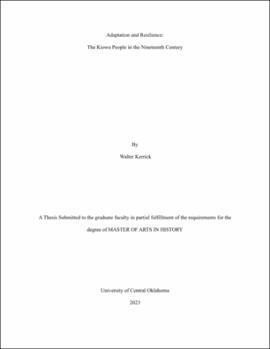| dc.contributor.advisor | Panther, Natalie | |
| dc.contributor.author | Kerrick, Walter | |
| dc.date.accessioned | 2024-02-29T21:53:22Z | |
| dc.date.available | 2024-02-29T21:53:22Z | |
| dc.date.issued | 2023 | |
| dc.identifier.other | (AlmaMMSId)9983008810602196 | |
| dc.identifier.uri | https://hdl.handle.net/11244/340198 | |
| dc.description.abstract | The history of American Indians has historically been viewed through an Anglo-European lens and not from the perspective of the subject population. The aim of this thesis is to give a brief account of the Kiowa people from their perspective and to focus on their hardihood in the face of American aggression. The literature from the late 1800s was largely constructed from observation of the Kiowa and interviews with the Kiowa. While some studies prioritized Kiowa accounts and records most relied most heavily on white observations of the Kiowa. In the 1900s this trend continued and those accounts from the late 1800s became the foundation for any research into Kiowa history and culture. It was not until the second half of the 1900s that many historians began critically evaluating those works and attempts were made to consult with the Kiowa people’s own recollections more often. Since the late 1900s and through to the present more emphasis has been put on the importance of Native narratives when constructing histories about native peoples. The Kiowa are a people who have consistently adapted to the world in which they live, acquiring and making their own elements borrowed from other cultures while retaining a strong cultural and historical identity for themselves. This thesis is a case study, examining the survival and adaption of one people. As such the research methods utilized were qualitative. Texts written by American and European academics were evaluated and compared to as many first-hand Kiowa accounts as could be located. The resulting work reflects as closely as possible a history of the Kiowa during the tumultuous nineteenth century reflecting their own experiences and not those of the dominate white population. This research has found that, though change was often painful for the Kiowa as the United States closed in around them, they successfully adapted to the world in which they found themselves. This was not a new process for them, as they had only acquired the Plains culture sometime in the late 1500s or early 1600s, an event that completely transformed their culture. This shift was even more radical than the one they found themselves faced with in the late 1800s as they were forced to adapt to an American way of life centered on agriculture and commerce. | en_US |
| dc.rights | All rights reserved by the author, who has granted UCO Chambers Library the non-exclusive right to share this material in its online repositories. Contact UCO Chambers Library's Digital Initiatives Working Group at diwg@uco.edu for the permission policy on the use, reproduction or distribution of this material. | |
| dc.subject.lcsh | Kiowa Indians--History--19th century | |
| dc.subject.lcsh | Kiowa Indians--Case studies | |
| dc.title | Adaptation and resilience : the Kiowa people in the nineteenth century | en_US |
| dc.type | Academic theses | |
| dc.contributor.committeeMember | Loughlin, Patricia | |
| dc.contributor.committeeMember | Lacher, Katrina | |
| dc.thesis.degree | M.A., History | |
| dc.subject.keywords | Ft. Sill | |
| dc.subject.keywords | KCA Reservation | |
| dc.subject.keywords | Kiowa | |
| dc.subject.keywords | Kiowa-Comanche-Apache | |
| dc.subject.keywords | Native American studies | |
| dc.subject.keywords | American history | |
| dc.identifier.oclc | (OCoLC)1424475761 | |
| thesis.degree.grantor | Jackson College of Graduate Studies | |
